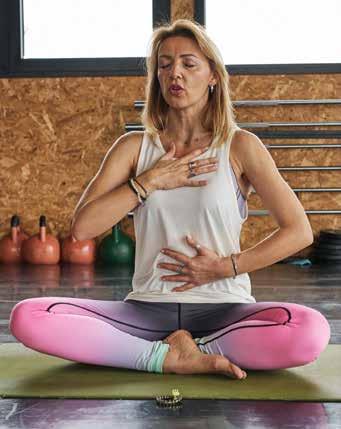
4 minute read
Ancient wisdom for modern angst
The Hindu God Ganesha is associated with wisdom – and good luck.
We’ve longed to be out and about, but for many post-pandemic anxiety is taking the joy out of life. Therapeutic yoga can help.
Advertisement
BY LISA GREENBAUM
After the intensity of nearly a year and a half waiting out this global pandemic and months of praying, begging and pleading to the powers that be to ease restrictions, a brandnew fear arose. What will it be like to step back out into the world again? Most of us expected that once openings were announced, all our anxieties would slip away. Yet for many, it only made them increase. After living so long under stay-at-home-orders, social distancing and no group gatherings, including with our loved ones, we’ve become like prisoners tasting freedom for the first time, grateful, overwhelmed, and maybe even afraid all at the same time.
This is exactly how I felt and I was surprised. Where being out and about amid the hustle of people all around was something I always loved, now it drives anxiety. I worry about making others feel uncomfortable if I’m too close and then I feel claustrophobic with so many people close by. I worry about being awkward and saying dumb things because I’ve forgotten how to speak to strangers. My senses are overloaded quickly just by leaving my house that I need extra down time to recover from it all. Sometimes I don’t want to leave at all. The more I talked to people, the more I realized many others were feeling the same way. It was time to dig a little deeper into my Yoga practice and explore my tools for grounding. The concept of grounding is used by mental health professionals as part of their mindfulness programs. Grounding establishes feelings of safety in our bodies, helping us to become more present and thereby releasing feelings of unease and anxiety. These very concepts and exercises have their roots in ancient Yoga. We develop the ability to clear our monkey minds and turn down the endless feedback loops that are often the precursor to anxiety. Where do we start?
For me it’s coming right back to the earth. I love to put my bare feet on the grass and spend more time outside in nature, sitting in the shade reading a book or drinking tea. Gardening and re-potting my house plants become special rituals. More specific tools from Yoga include: GUIDED MEDITATION: check out this free GUIDED MEDITATION FOR GROUNDING I recorded on Neurovine: neurovine.ai/grounding-meditation?hsLang=en.

There are lots of other free resources on YouTube, or apps such as Insight Timer or Calm. BREATH WORK: something I do several times a day; the bonus is it helps with heart health too by improving cardiovascular ability. Three-part breath is simple and effective. Place one hand on your chest, one hand on your belly and as you breathe in through your nose feel your belly expand. Continue to breathe in, feeling your breath in your ribs and finally, at the last part of your breath, in your chest. Exhale slowly from your chest, ribs and belly. Practice this 5-10 times, either seated or lying down. Box breathing involves a square-shaped breath pattern. Inhale and slowly count to 5. Hold your breath for the same count of 5. Exhale, again to a count of 5 and then hold your breath out for 5. Try this 5-7 times, again either seated or lying down. Breath work (or pranayama in Yoga) is the quickest and most effective way to stave off feelings of anxiety naturally. The best part is it’s free and you can do it anywhere and at any time. Simply noticing your breath and working to slow it down by breathing in and out of your nose instead of your mouth can quickly reduce the anxiety response. I hope these tools help you as well as we continue to navigate the unknown, which is really what life is all about anyway, isn’t it? I have enjoyed sharing my Yoga tips with you over the last few issues, if you are looking for more Yoga Therapy resources, please visit my website: lisagreenbaum.com.
STAY SAFE – BUT DON’T STRESS ABOUT IT
Recently, Melissa Couto Zuber of the CBC reported that “safety habits formed during the pandemic, and continued messages from officials about COVID risk, can stir up anxiety as people try navigating a world with eased restrictions.”
Surveys from across North America suggest around half of us have some anxiety about reopening, said Dr. Sanjeev Sockalingam, a psychiatrist and clinical scientist at the Centre for Addiction and Mental Health. “Those fears can bring other anxieties to the forefront. People who lost loved ones or experienced other life-altering events such as changing jobs or moving to new cities might find themselves having to redefine their identity and new roles in society.”
Lisa Greenbaum, E-RYT 500 and C-IAYT yoga therapist, has worked with many individuals by using yoga to release trauma, find ease from chronic pain and tension and develop a deeper connection to mind, body and spirit. She has over 750 hours of yoga education and logged 4,000+ teaching hours. She is also a certified fitness instructor and personal trainer with canfitpro, and a Women in Fitness Association (WIFA) Global Ambassador.
lisagreenbaum.com










